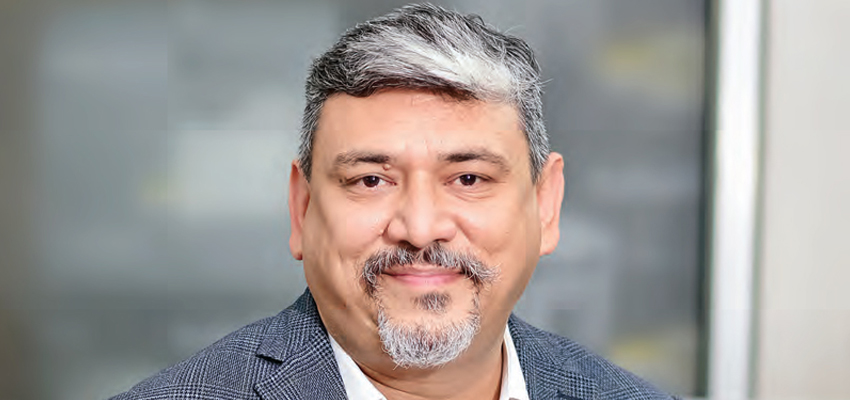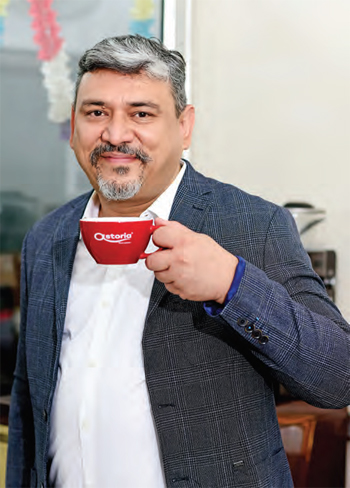Champion of Coffee Culture

Around two decades ago, this man saw an opportunity, an untapped sector just waiting to be explored. Since then, India has seen a rapid growth in the coffee and coffee machine market. And Vikram Khurana not only witnessed this evolution but also played a great role in its development too. Worldwide, this industry is a multibillion-dollar business and India is leaving no stone unturned to rise to those standards. Although the outbreak of Covid hampered this industry, it opened a sort of unnoticed avenue for Vikram-the home segment. He is currently the CEO, Kaapi Solutions, a renowned barista and a coffee consultant too. In a conversation with the Corporate Citizen, Vikram talks about how India is perceiving the coffee and coffee machines arena, the boom of café culture and impact on employment, how can India encash by building top-notch coffee machines
"When it comes to coffee, I have a different level of excitement. It is because coffee was a new subject back then and we wanted to spread its essence. It is always exciting to train, teach and talk about coffee in India"
Corporate Citizen: Give us a brief background about yourself.
Vikram Khurana: I am born and brought up in Delhi. I guess since the very beginning, owing to various reasons, I had an affection towards food. To take carry forward my love for food, I took up a course in hotel management. Around 1999, I decided to test my skills and set foot in the United Kingdom with an intent to become a chef. I did work there for a year. Within no time, I realised that I could learn more about food in my country.
While I was figuring out my life, I thought of taking a chance and moving to the States. It was around the same time when the World Trade Center was attacked. And as luck would have it, my visa did not fall through. But just then, I was given a new opportunity to serve the Café Coffee Day, Delhi, as their Cafe Manager. Within a fortnight they realised my talent and shifted me to their F&B vertical. That was when I was exposed to the world of coffee. Not that I wasn’t aware of it but I got a chance to embrace its true essence. I got to know this industry better. And the hands-on experience that I received gave me the chance to utilise my skills. I introduced the latte art concept at our various stores, which people dearly loved. This was the time when the café culture was booming.
In the early 2000s, we got a chance to represent India at the World Barista Championship in Oslo. This sort of changed my life. Our team performed well, and as a result, we scored the third position. That was quite unexpected. But what I want to say is, coffee for us had become a passion by then. And when you are so involved in some art, you start seeing wonders. And Kappi Solutions is the outcome of that.
CC: But before starting your venture, you also had a brief stint with a Cioconat Lounge, Dubai, as their Business Development Manager. How was that experience?
Yes, indeed. That experience added to my knowledge and expertise. I worked in the Middle-East for three years. Before joining Cioconat, I started a chain called Blends and Brew. Owing to my experience, I was able to curate and conceptualise their whole process. From there I moved to Cioconat Lounge, which was the first kind of lounge that offered 32 different kinds of chocolate.
My role included assisting the franchisee in setting up its operations and keeping a check on the quality and functions. I did that for a year and moved to India. Without taking any more time, I decided to start my first venture Kaapi Machines, which was into the equipment business. And Kaapi Solutions, which was started in 2017, is a by-product of that. We are a one-stop shop of world-class imported coffee roasting machines associating with premium brands from across the globe. Our company focuses on a 360-degree approach towards sales, service, training and education.
"India is a home of several talented people. With their help, we can surely generate a great demand. Presently, we have a handful of companies in India that produce coffee machines"

CC: People in India swear by tea, weren’t you hesitant before entering this industry?
On the contrary, I was super excited. When it comes to coffee, I have a different level of excitement. It is because coffee was a new subject back then and we wanted to spread its essence. It is always exciting to train, teach and talk about coffee in India. Coffee has the power to attract people and we knew Indians were quite open to welcome this new culture. With that, they wanted to know more about how to enjoy a nice cup of coffee. We encashed on this opportunity and started sowing the seeds of coffee across our country. We not only guided them with coffee solutions but we also trained and exposed the baristas to the technology that enhances the experience of drinking this beverage. We used to receive several queries-some wanted to set up their coffee shops others wished to learn more about this art. In the past 20 years, we have collected some worthful amount of data. Coffee is still in the nascent stage in our country. We are sharing the data with the purpose that people understand this curve and grow leaps and bounds.
CC: Now that you have been in this industry for so long, can you enlighten us about the coffee and coffee machines culture in our country?
In the past two decades, I have seen people appreciate, understand and differentiate amongst the types of coffee. The majority of them still prefer coffee with milk but a lot of them are inching towards black coffee. Back then, we had a very commercial and mediocre coffee where we mostly used a single boiler kind of a machine. Now, this sector has grown tremendously.
Unfortunately, India does not manufacture coffee machines. All over the world, people still depend on Italy for the machines, owing to their quality. They have mastered this technology. However, the growth curve has been amazing. Earlier, we had only two brands, now there are more than 30 compatriots selling coffee, machines and grinders. The competition now has become fierce. India, today is a market for 2500-3000 coffee machines per year. Of course, the credit goes to people’s curiosity and the advent of technology. Back then, we did not have any technology to get the best extraction out of the espresso. Now, we have the technology that helps the barista to choose the parameters that matter the most.
CC: On the same lines, can you tell us how has the café culture revamped the business sense and changed the ethos of employment in our country?
In the past few years, the café culture has been steadily growing-up to a point where today have almost 13,000-plus cafes, organised and unorganised. Cafes are the most assessable places to hang out or even work. Over time, people are inching closer to the café culture and this has given several a ray of hope in terms of employment. When we take into consideration the global picture, being a barista in Europe is the most admired job. There is no technical requirement to enter this field, apart from your love and passion for coffee. Recently, we trained some tribals from Madhya Pradesh. Now they work for a resort where they make fantastic coffee. They are keen and focused and their love of coffee is helping them earn a living. Like so, we have several others. This has given us a sense that the business and employment scene is ever evolving. Back in the 2000s, I got a hint that the salary of a barista was the bare minimum. Now, their work is acknowledged, and they are well respected.
Another important aspect is that India is a business hub and people from across the globe visit our country to scale their business. And these corporates and business officials are the ones who take their coffee very seriously. This is precisely why the corporate sector has welcomed the coffee scene with open arms. Today, luxury hotels feel having a coffee machine is a must wherein their guests can enjoy a great cup of coffee and the baristas should tap this segment. For that, the management schools will play a great role. They should offer some customised courses in the arena where the barista can encash on it.
CC: It goes without saying that the coffee market globally has grown leaps and bounds. Tell about some of the trends and how India can benefit from them?
Although this culture has started barely 40 years ago, India has quickly adapted to this change. India is playing a great role when comes to global coffee market expansion. And compared to that, India is growing at a much higher rate. Everyone in this industry is sure that this market is going to boom like never before. A recent study shows that the Indian coffee machine market is expected to grow at a Compound Annual Growth Rate (CAGR) of over 16 per cent by 2023. The reasons for this are many and one of them is the lifestyle that we are leading. And the increasing dual household income across the country is adding to that. We are probably absorbing a lot more machines than we were before. This is opening new doors of opportunity for our people. We explore in terms of land to grow more coffee as well. We are proud to say that India is the fifth or the sixth-largest exporter of coffee.
"Our country has understood the worth of a good coffee machine and how it can serve our people. Hence, they are investing in a good coffee machine that gives their employees what they are looking for"
CC: With the hope to get good returns, a lot of cafes, restaurants and resorts are investing in a good coffee machine. But the point here is why is the coffee making machine so expensive?

Everything that is of good quality comes at a price. Moreover, these are not coffee making machines, these are indeed cash making machines. When you invest in a good product, within no time you will start getting the returns. The cost of an espresso machine depends on the components and features. These machines come in three variants, semi-automatic, fully automatic, and manual. The internal components such as the grinder, portafilters, the thermal block, the brew group and others come at a high price. And not to forget the classic finishing of the machine, stainless steel, steam wand, brushed chrome, etc., these add up to the expenses.
We are working with Astoria, a company that creates one of the best coffee machines. The machines fall in the range of 1.4 lakhs to 16 lakhs. The bottom line is, a good coffee machine can serve you up to 200 cups of coffee per day. At this rate, if a café sells this coffee for Rs.100, which is a bare minimum, the entire capital investment comes back in three months. After this, the machine is yours for years to come. Where else can you make a capital investment this quick? And to add to this, the cost of the ingredients for making coffee is very low, which is roughly 10-15 per cent. And the profit margins are amazing. The profitability is also important along with the turnover.
CC: A good cup of coffee gives a great start to most of the corporate’s day. Can you tell us more about how this sector adds value to the coffee market?
The office coffee market has been tapped recently. When work takes a toll on them, they move to a cup of coffee that surely refreshes them. Our country has understood the worth of a good coffee machine and how it can serve our people. Hence, they are investing in a good coffee machine that gives their employees what they are looking for. They buy machines in the range of 6-7 lakhs. At a touch of a button, the entire office can smell, taste, and enjoy the freshly brewed coffee.
CC: The outbreak of Covid has restricted these corporate at home. While they work from home, how is the market recovering from this loss?
Globally, the coffee is a multi-billion dollar business. Yes, the outbreak of the virus had crippled a lot of industries. In fact, ours was one of the last industries to get back on its feet. The market incurred a loss of more than 40 per cent. A report by the International Coffee Organization’s (ICO) Coffee Market Report suggested that the wrath of the coronavirus has slowed down production by 2.2 per cent. And to add to that, there is a 0.5 per cent decrease in consumer demand. However, things are getting back to the normal. And within no time, this industry will be up and running.
When the lockdown was first announced, we were really scared for our employees and customers as well. But such is life, and we need to keep moving on. We Indians know how to fight back. Our idea was to keep shipping out the machines. Every cloud has a silver lining. Sure, Covid disrupted most businesses. It even restricted most people in the four walls of their homes. Some are still working from home. And as one door closes, another opens. We are tapping the home segment, and now, we are doing much better. Although people are stuck at home, a good cup of coffee is something that they always wish for. They don’t go to offices nor cafes but with our coffee machines for the home segment, their dream has come true. And once the lockdown was opened, we gave the best possible service to our clients to get their machines rolling. With this, we wanted to begin with a fresh start. We redesigned our logo and worked on the marketing. We even made our presence felt on the e-commerce sites and social media, this is going phenomenally well. Overall, we have installed 7000 machines. And we are optimistic that we will return to normalcy and soon people can enjoy their coffee at their offices or cafes.
CC: India is a country full of talent. If so, why are we not entering the race of making the best coffee machines?
The scene is changing but at a very slow rate. You need to understand that we are barely a few decades old in this business. Globally, industries spend millions of dollars on research and development. And when your foundation is so strong, you ought to have machines which are imported by all. This, in turn, increases their yearly revenue. Indian, currently, cannot spend a lot on research. For this, we need to first generate a demand, consequently, the production needs to start rolling and the export will help our business boom. And the revenue should be again invested in R&D of coffee. And only then we can compete with the global market.
The rest of the countries are quite ahead of us. But as you mentioned, India is a home of several talented people. With their help, we can surely generate a great demand. Presently, we have a handful of companies in India that produce coffee machines. These machines are not up to the standard but it is a good beginning.